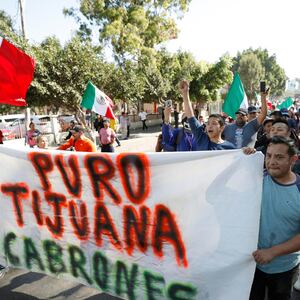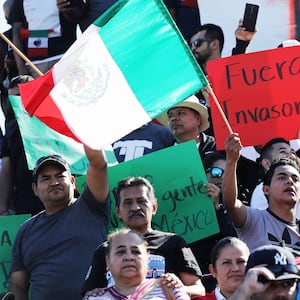TIJUANA, Mexico—U.S. Border Patrol agents in riot gear fired rounds of tear gas at hundreds of migrants who rushed a border crossing in Tijuana on Sunday. The clash began as a peaceful march of about 500 people protesting for the U.S. to speed up the processing of asylum requests at the border. Some of the participants in the protest scaled a border fence, while others ran across a canal that separates the two countries and tried to enter the U.S. through holes in the fence.
Migrants in Tijuana have been trying to enter the U.S. legally and present themselves to U.S immigration authorities for asylum, but the U.S. processes only about 100 applications for asylum a day, a rate that has slowed in recent months with new restrictions by the Trump administration.
Wait times for asylum interview can last months, and the difficult conditions in Tijuana leave migrants from the famous Central American caravan feeling they have no way out.
Keyla Villatorres fled the growing violence in Honduras last month with her 8-year-old son Justin and joined an exodus of migrants to the United States.
The 25-year-old traveled more than 2,500 miles in 40 days, taking refuge in this desert metropolis in the shadow of the U.S.-Mexico border. Along the way, she relied on the support of fellow migrants rather than hiring traffickers known as coyotes—whom she couldn't afford—to smuggle them through Mexico.
Three thousand migrants from the caravan reached Tijuana during five days in November, a pace city government officials say is unprecedented and possibly unsustainable. The city converted a municipal sports complex to an emergency campground for them.
Villatorres has heard opponents of the caravan from Central America refer to migrants as a threat to public order and safety. She knows President Trump has mobilized several thousand American troops at the border who are setting down concrete barriers and concertina wire in case migrants storm the border.
For her, however, the caravan is about safety in numbers.
Drug gangs and corrupt government officials are known to prey upon Central American migrants in Mexico. There have been robberies, kidnappings, even massacres. The route north is especially dangerous for women. According to Amnesty International, 60 percent of migrant women and girls from the nations of Honduras, El Salvador and Guatemala are raped while migrating.
Traveling with migrants in a high-profile caravan of such historic size gives single mothers like Villatorres a measure of security. "I feel safe," Villatorres said of her experience in the caravan. "We come with family, with friends, and we meet each other. We share what we can and support one other."
She shares a tent with another single mother and that woman's son, who is around Justin's age.
At the sports complex, Villatorres camps on a slight rise that overlooks a hub of migrant activity at a youth baseball park. Laundry dries under the electric scoreboard, foam mattresses line the hard floors of the home and visiting team dugouts, and a warren of tents, tarps and blanket shelters spreads across right field.
Like many of the migrants here, she intends to seek asylum in the U.S through Tijuana.
Even the first step in the process, however, requesting asylum and getting a "credible fear" interview, could take weeks or months due to a more restrictive policy under Trump.
In the morning, at a free legal clinic in the right-field bleachers, an immigration lawyer told her that the possibility exists she could be detained separately from Justin while authorities in the U.S. take months to review her asylum claim.
According to U.S. Customs and Border Protection, 93 percent of the migrants on a previous caravan in April passed a credible-fear interview and were allowed into the country to continue the asylum process.
Darwín Mejía is a Honduran close in age to Villatorres. He is 23, a former employee of a textile mill, and like her, is venturing far from Honduras for the first time. Mejía stays in a smaller tent beside hers and is a constant companion. "We're just good friends," she says.
They met at an emergency camp like this for Central American migrants in Mexico City. "We met at a hotel similar to this one," Mejía says, making a joke about the poverty of the campground. "She was staying in the room next door."
Villatorres handed me a sweatshirt to use as a seat cushion on the dirt floor of the campsite. "It's the best we can do until the living room furniture arrives," she said.
Mejía says that if the three of them act the part of a family, it is because they share the same food, dress in hand-me-down clothes from the same charity bin, and wake up in the morning with "the same dust in the lines of our face, the same soreness in our feet."
Villatorres adds that together the three of them have trekked 20 miles in a day.
The caravan, Mejía says, is comprised of people like them who come from nothing, who have nothing but family, and who support one other. "We are wholesome people with a drive to succeed and help those who are to close us," he said.
The border literally looms large on the horizon for thousands of migrants camped at the emergency shelter here: a few lanes of highway are all that separate the border wall from the left field fence of the baseball park.
However much they look the part of young parents, the fact is Villatorres and Mejía joined the caravan of migrants separately and are proceeding to the U.S. on separate tracks. They are divided along a line common to the caravan as a whole.
Villatorres and her son are refugees. Something violent happened to her a month ago in her native city of El Progreso, an attack she is reticent to discuss, at least not here in front of Mejía. What she told me is that it went beyond threats, that a gang was involved, that she was the target and sole victim, and that she was too afraid of reprisals to report it to the police.
Mejía, however, is a migrant. Poverty, as opposed to violence, is the main reason he joined the caravan. He resigned from a full-time job at the textile mill in Comayagua because the $330 he earned in a month was not enough to cover his basic needs.
When a nationwide strike against election fraud rocked Honduras last year, Mejía fraternized with strikers who blocked his route to work. But he does not consider himself political, or a target of the government. He has a six-month-old daughter he has never met who lives in Houston, and it was in the hope of meeting the child and reuniting with her mother that he embarked on the caravan last month.
An immigration lawyer from Los Angeles who was giving free legal consultations told me that refugees like Villatorres often have to endure six or eight months of family detention while the U.S. evaluates their asylum claim. Then-Attorney General Jeff Sessions declared in June that claims by migrants pertaining to domestic violence or gang violence perpetrated by non-governmental actors "will not qualify for asylum.”
Such cases are still winnable, the attorney says, but under the Trump administration the process is much harder, and it is all but impossible for them to prevail without the help of an attorney. "They'll kill me if I go back," Villatores said.
A migrant in Mejía's situation, she added, who just wants a permit to work and earn money for his family, "might be better off staying in Mexico."
"It's extremely difficult for them," she said.
Mejía is weighing the alternatives. One is Canada, another is to attempt to cross the border illegally.
There is no rush, no need to decide now. He and Villatorres are focused on the day-to-day hardship in Tijuana, and on prolonging a certain air of domesticity they have cultivated in the campsite, a type comfort and order reminiscent of the homes of young parents.
Justin, the 8-year-old, comes over and rests his head on Mejía's shoulder. "Tell the nice reporter what you want to do in the United States," Mejía prompts the boy.
"I want to go to college and be a lawyer," Justin says.
Villatorres and Mejía imagine what it would be like to see each other again on the other side. But the future is to them as opaque as the steel barrier looming over left field.
"We met on the road and we've been together ever since," Mejía says. "I'll stay here and wait with her."








